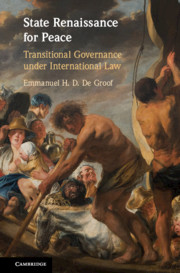Book contents
- Reviews
- State Renaissance for Peace
- State Renaissance for Peace
- Copyright page
- Dedication
- Contents
- Tables
- Foreword
- Preface
- Acknowledgements
- Additional material
- Abbreviations
- Introduction Transitional Governance Today
- Part I The Unchartered Territory of Transitional Governance
- 1 The Rise and Internationalisation of Transitional Governance
- 2 Limitations of Existing Literature
- Part II Foundation and Actors of Transitional Governance * Sources of Ius in Interregno
- Part III Self-Determination through Transitional Governance
- Part IV Moderating External Influence on Transitional Governance
- Index
1 - The Rise and Internationalisation of Transitional Governance
from Part I - The Unchartered Territory of Transitional Governance
Published online by Cambridge University Press: 10 September 2020
- Reviews
- State Renaissance for Peace
- State Renaissance for Peace
- Copyright page
- Dedication
- Contents
- Tables
- Foreword
- Preface
- Acknowledgements
- Additional material
- Abbreviations
- Introduction Transitional Governance Today
- Part I The Unchartered Territory of Transitional Governance
- 1 The Rise and Internationalisation of Transitional Governance
- 2 Limitations of Existing Literature
- Part II Foundation and Actors of Transitional Governance * Sources of Ius in Interregno
- Part III Self-Determination through Transitional Governance
- Part IV Moderating External Influence on Transitional Governance
- Index
Summary
The recourse to TG is flourishing, especially as state creation has passed its zenith, and ITA is considered too costly while also being normatively contested. Through TG, international involvement can furthermore be cost-efficient and discrete while leaving its marks on virtually all state renaissance components. In addition, some might try to argue that TG is preferable on pseudo-legal grounds. In any event, state transformations are subject to internal and external influences in many fields, including a field going to the core of a state’s business: regime transformation and reconstitutionalisation. TG is placed centre stage in international diplomacy, and already plays an important role for the international security system. In public discourse, external involvement is often associated with the peace-through-transition paradigm and the assistance model. Yet, such discourse barely conceals that goals other than international peace and security namely constitutional geopolitics – can be pursued through assistance to TG.
Keywords
- Type
- Chapter
- Information
- State Renaissance for PeaceTransitional Governance under International Law, pp. 33 - 62Publisher: Cambridge University PressPrint publication year: 2020

